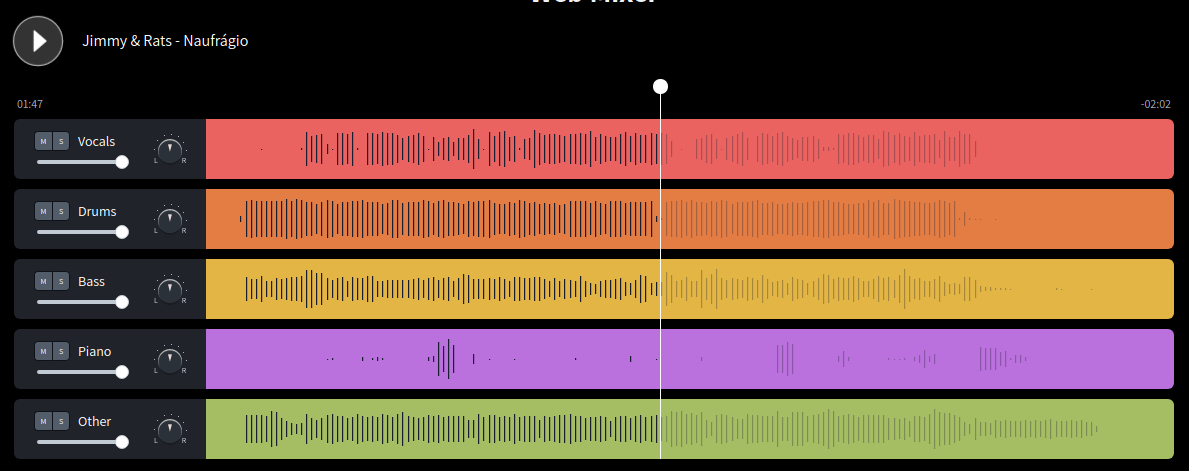Superpowered Inc develops the Superpowered Web Audio JavaScript and WebAssembly SDK ("JS/WASM SDK") for modern web browsers, websites, progressive web apps and more.
Developers can use Superpowered interactive audio features in JavaScript without the need of building, initializing or even touching WebAssembly or C++.
For the most up-to-date information, see: https://superpowered.com/js-wasm-overview
The JS/WASM SDK is contained in this repository. For C++ SDKs for native apps, we offer Superpowered C++ Audio SDK, C++ Networking SDK, and C++ Crypto SDK featuring low-power and real-time latency. They can be found here: https://github.com/superpoweredSDK/Low-Latency-Android-iOS-Linux-Windows-tvOS-macOS-Interactive-Audio-Platform/
npm install @superpoweredsdk/web
See usage guide over at https://docs.superpowered.com/getting-started/how-to-integrate?lang=js
- Effects: echo, delay, bitcrusher, flanger, gate, roll, reverb, whoosh, compressor, clipper, limiter, 3 band EQ
- Filters: resonant low-pass, resonant high-pass, low-shelf, high-shelf, bandpass, notch, parametric
- Music Analysis: bpm detection, key detection, beatgrid detection, audio waveform, filter bank analysis
- Object-based 3D Audio Spatializer
- Mixing: stereo mixer, mono mixer, crossfading, mixing, volume, peak
- Format conversion (32 bit, 24 bit, 16 bit)
- Audio Resampler
- Time domain to frequency domain, frequency domain to time domain
- Time Stretching, Pitch Shifting
- FFT: complex, real, real-polar
- Web Audio I/O, support for ScriptProcessorNode, Workers, Worklets and Audio Worklet
Real-time (NOT RENDERED), low-latency time-stretching in the browser:
https://superpowered.com/js-wasm-sdk/example_timestretching/
Real-time low-latency reverb and filter in the browser:
https://superpowered.com/js-wasm-sdk/example_effects/
Real-time low-latency guitar distortion in the browser:
https://superpowered.com/js-wasm-sdk/example_guitardistortion/
The Superpowered Web Audio JavaScript and WebAssembly SDK supports the following web browsers: official public stable versions of all major web browsers, including desktop and mobile variants (iOS, Android), such as Chrome, Safari, Firefox and Opera. The only exception is Microsoft Edge, that requires developer build version 74 minimum.
Superpowered offers multiple support options.
Developer Documentation (C++ and JavaScript): https://docs.superpowered.com
Email: [email protected]
Knowledge base: https://superpowered.zendesk.com/hc/en-us
StackOverflow: https://stackoverflow.com/search?tab=newest&q=superpowered
YouTube: https://www.youtube.com/playlist?list=PLtRKsB6a4xFMXJrZ9wjscOow3nASBoEbU
Paid support options: https://superpowered.com/support
JS/WASM SDK is licensed separately on a case-by-case basis. Parties interested in using JS/WASM SDK must contact [email protected]. Free license may be available at our sole discretion. Parties are encouraged to experiment and create private applications with the JS/WASM SDK, but may not launch publicly and/or without a license, which we shall grant at our sole discretion. Please note that any unauthorized use of JS/WASM SDK may result in interruption of service without notice.
For details, please see: https://superpowered.com/licensing
For licensing inquiries, please email [email protected].
Superpowered offers custom development services focusing on low-latency, interactive audio applications for mobile, web, desktop and embedded.
For development inquiries, please email [email protected].
If you want to be informed about new code releases, bug fixes, general news and information about Superpowered, please email [email protected].
For licensing inquiries, please email [email protected].
Superpowered FFT benefits from ideas in Construction of a High-Performance FFT by Eric Postpischil (http://edp.org/resume.htm).
The Superpowered MP3 and AAC decoder benefits from optimizations by Ken Cooke.




